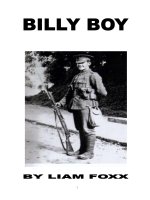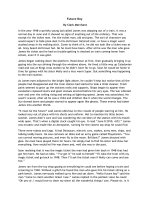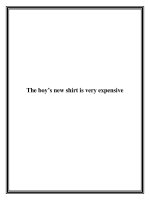Brownsmiths boy
Bạn đang xem bản rút gọn của tài liệu. Xem và tải ngay bản đầy đủ của tài liệu tại đây (1.17 MB, 353 trang )
TheProjectGutenbergEBookofBrownsmith'sBoy,byGeorgeManvilleFenn
ThiseBookisfortheuseofanyoneanywhereatnocostandwith
almostnorestrictionswhatsoever.Youmaycopyit,giveitawayor
re-useitunderthetermsoftheProjectGutenbergLicenseincluded
withthiseBookoronlineatwww.gutenberg.org
Title:Brownsmith'sBoy
ARomanceinaGarden
Author:GeorgeManvilleFenn
ReleaseDate:May4,2007[EBook#21293]
Language:English
***STARTOFTHISPROJECTGUTENBERGEBOOKBROWNSMITH'SBOY***
ProducedbyNickHodsonofLondon,England
GeorgeManvilleFenn
"Brownsmith'sBoy"
ChapterOne.
TheBoyintheGarden.
IalwaysfeltasifIshouldliketopunchthatboy’shead,andthendirectly
afterIusedtofeelasifIshouldn’tcaretotouchhim,becausehelooked
sodirtyandragged.
It was not dirty dirt, if you know what I mean by that, but dirt that he
gatheredupinhiswork—bitsofhayandstraw,anddustoffashedfloor;
mudoverhisbootsandonhistoes,foryoucouldseethatthebigboots
heworeseemedtobelikeakindofcoarseroughshellwithagreatopen
mouth in front, and his toes used to seem as if they lived in there as
hermit-crabs do in whelk shells. They used to play about in there and
wagglethissideandthatsidewhenhewasstandingstilllookingatyou;
andIusedtothinkthatsomedaytheywouldcomealittlewayoutand
waitforpreylikethedifferentmolluscsIhadreadaboutinmybooks.
Butyoushouldhaveseenhishands!I’veseenthemsocoatedwithdirt
thatithungontheminknobs,andatsuchtimesheusedtoholdthemup
to me with the thumbs and fingers spread out wide, and then down he
wouldgoagainandcontinuehiswork,which,whenhewasinthisstate,
wouldbepullinguptheweedsfromamongtheonionsinthelongbeds.
I didn’t want him to do it, but he used to see me at the window looking
out; and I being one lonely boy in the big pond of life, and he being
anotherlonelyboyinthesamebigpond,andbothfloatingaboutlikebits
of stick, he seemed as if he wanted to gravitate towards me as bits of
stick do to each other, and in his uncouth way he would do all sorts of
thingstoattractmyattention.
Sometimesitseemedasifitwastofrightenme,atotherstoshowhow
clever he was; but of course I know now that it was all out of the
superabundantenergyhehadinhim,andthenaturallongingofaboyfor
acompanion.
I’ll just tell you what he’d do. After showing me his muddy fingers, and
crawlingalonganddiggingthemashardashecouldintothesoiltotear
out the weeds, all at once he would kick his heels up in the air like a
donkey. Then he would go on weeding again, look to see if I was
watching him, and leave his basket and run down between two onion
bedsonall-fourslikeadog,runback,andgoonwithhiswork.
Everynowandthenhewouldpullupayoungonionwiththeweedsand
pickitout,giveitarubonhissleeve,putoneendinhismouth,andeatit
gradually, taking it in as I’ve seen a cow with a long strand of rye or
grass.
Anothertimehewouldfalltopunchingthegroundwithhisdoubledfist,
makeabasin-likedepression,puthisheadin,supporthimselfbysetting
his hands on each side of the depression, and then, as easily as could
be,throwuphisheelsandstanduponhishead.
Itseemedtobenotroubletohimtokeephisbalance,andwhenuplike
that he would twist his legs about, open them wide, put them forwards
and backwards, and end by insulting me with his feet, so it seemed to
me,forhewouldsparatmewiththemandmakebelievetohitout.
Allatoncehewouldseeoneofthelabourersinthedistance,andthen
downhewouldgoandcontinuehisweeding.
Perhaps, when no one was looking, he would start up, look round, go
down again on all-fours, and canter up to a pear-tree, raise himself up,
andbeginscratchingthebarklikeoneofthecatssharpeningitsclaws;or
perhapstrottoanapple-tree,climbupwithwonderfulactivity,creepout
along a horizontal branch, and pretend to fall, but save himself by
catchingwithandhangingbyonehand.
Thatdonehewouldmakeasnatchwithhisotherhand,swingaboutfora
few moments, and then up would go his legs to be crossed over the
branch, when he would swing to and fro head downwards, making
derisivegesturesatmewithhishands.
SoitwasthatIusedtohatethatboy,andthinkhewaslittlebetterthana
monkey; but somehow I felt envious of him too when the sun shone—I
didn’t so much mind when it was wet—for he seemed so free and
independent,andhewassoactiveandclever,whilewheneverItriedto
stand on my head on the carpet I always tipped right over and hurt my
back.
That was a wonderful place, that garden, and I used to gaze over the
highwallwithitsbristleofyoungshootsofplum-treesgrowingoverthe
coping, and see the chaffinches building in the spring-time among the
greenleavesandmilky-whiteblossomsofthepear-trees;or,perhaps,it
would be in a handy fork of an apple-tree, with the crimson and pink
blossomsallaround.
Those trees were planted in straight rows, so that, look which way I
would,Icouldseestraightdownanavenue;andunderthemtherewere
rows of gooseberry trees or red currants that the men used to cut so
closelyinthewinterthattheyseemedtobecompleteskeletons.
Where there were no gooseberries or currants, the rows of rhubarb
plants used to send up their red stems and great green leaves; and in
other places there would be great patches of wallflowers, from which
waftsofdeliciousscentwouldcomeinattheopenwindow.Inthespring
there would be great rows of red and yellow tulips, and later on sweetwilliamandrockets,andpurpleandyellowpansiesingreatbeds.
I used to wonder that such a boy was allowed to go loose in such a
garden as that, among those flowers and strawberry beds, and, above
all,apples,andpears,andplums,forintheautumntimethetreestrained
up against the high red-brick wall were covered with purple and yellow
plums, and the rosy apples peeped from among the green leaves, and
thepearswouldhangdowntillitseemedasifthebranchesmustbreak.
Butthatboywentaboutjustasheliked,anditoftenseemedveryhard
that such a shaggy-looking wild fellow in rags should have the run of
suchabeautifulgarden,whileIhadnone.
Therewasalittlesingleopera-glassonthechimney-piecewhichIused
totakedownandfocus,sothatIcouldseethefruitthatwasripe,andthe
fruit that was green, and the beauty of the flowers. I used to watch the
birds building through that glass, and could almost see the eggs in one
littlemossycupofachaffinch’snest;butIcouldnotquite.Ididseethe
tipsoftheyoungbirds’beaks,though,whentheywerehatchedandthe
oldonescametofeedthem.
ItwasbymeansofthatglassthatIcouldseehowtheboyfastenedup
his trousers with one strap and a piece of string, for he had no braces,
and there were no brace buttons. Those corduroy trousers had been
madeforsomebodyelse,Ishouldsayforaman,andpiecesofthelegs
hadbeencutoff,andtheupperpartcamewelloverhisbackandchest.
Hehadnowaistcoat,butheworeajacketthatmusthavebelongedtoa
man.Itwasajacketthatwasfustianbehind,andhadfustiansleeves,but
thefrontwasofpurpleplushwithredandyellowflowers,softeneddown
with dirt; and the sleeves of this jacket were tucked up very high, while
thebottomcamedowntohisknees.
Hedidnotwearahat,butthecrownofanoldstrawbonnet,thetopof
which had come unsewed, and rose and fell like the lid of a round box
with one hinge, and when the lid blew open you could see his shaggy
hair,whichseemedasifithadneverbeenbrushedsinceitfirstcameup
outofhisskin.
Theopera-glasswasveryusefultome,especiallyastheboyfascinated
me so, for I used to watch him with it till I knew that he had two brass
shank-buttonsandthreefour-holesofboneonhisjacket,thattherewere
nobuttonsatallonhisshirt,andthathehadblueeyes,asnub-nose,and
hadlostoneofhistopfrontteeth.
Imusthavebeenquiteasgreatanattractiontohimashewastome,but
he showed it in a very different way. There would be threatening
movements made with his fists. After an hour’s hard work at weeding,
without paying the slightest heed to my presence, he would suddenly
jump up as if resenting my watching, catch up the basket, and make
believe to hurl it at me. Perhaps he would pick up a great clod and
pretendtothrowthat,butletitfallbesidehim;whileoneday,whenIwent
tothewindowandlookedout,Ifoundhimwithagood-sizedswitchwhich
hadbeentheyoungshootofapeartree,andalumpofsomethingofa
yellowishbrowntuckedintheforkofatreeclosebywhereheworked.
Hehadabasketbyhissideandwasbusilyengagedasusualweeding,
for there was a great battle for ever going on in that garden, where the
weedswerealwaystryingtomastertheflowersandvegetables,andthat
boy’sdutyseemedtobetotearupweedsbytheroots,andnothingelse.
Buttherebyhissidestuckinthegroundwastheswitch,andassoonas
hesawmeatthewindowhegavealookroundtoseeifhewaswatched,
andthenpickedupthestick.
“Iwonderwhatheisgoingtodo!”Ithought,asItwistedtheglassalittle
andhadagoodlook.
He was so near that the glass was not necessary, but I saw through it
thathepinchedoffabitoftheyellowish-brownstuff,whichwasevidently
clay,and,afterrollingitbetweenhishands,hestuckwhatseemedtobe
a bit as big as a large taw marble on the end of the switch, gave it a
flourish,andthebitofclayflewoff.
I could not see where it went, but I saw him watching it, as he quickly
tookanotherpiece,kneadedit,andwithanotherflourishawaythatflew.
Thatbitevidentlywentoverourhouse;andthenexttimehetried—flap!
thepiecestruckthewallsomewhereunderthewindow.
Fivetimesmoredidhethrow,theclayflyingswiftly,tillallatoncethud!
cameapelletandstuckonthewindowpanejustabovemyhead.
Ilookedupattheflattenedclay,whichwasstickingfast,andthenatthat
boy, who was down on his knees again weeding away as hard as he
couldweed,buttakingnomorenoticeofme,andIsawthereason:his
masterwascomingdownthegarden.
ChapterTwo.
OldBrownsmith.
Iusedtotakeagooddealofnoticeofthatboy’smasterasIsatatthe
window, and it always seemed to me that he went up and down his
gardenbecausehewassofondofit.
LateronIknewthatitwasbecausehewasamarket-gardener,andwas
making his plans as to what was to be cut or picked, or what wanted
doingintheplace.
Hewasapleasant-lookingman,withwhitehairandwhiskers,andared
face that always used to make me think of apples, and he was always
dressed the same—in black, with a clean white shirt front, and a white
cravatwithoutanystarch.Perhapsitwassothattheymightnotgetinthe
mud,butatanyratehisblacktrouserswereverytight,andhistail-coat
wascutverybroadandloose,withcrosspocketslikeashooting-jacket,
andthesepocketsusedtobulge.
Sometimestheybulgedbecausehehadbastmattingfortyingupplants,
and a knife in one, and a lot of shreds and nails and a hammer in the
other; sometimes it was because he had been picking up fruit, or
vegetable marrows, or new potatoes, whatever was in season. They
alwaysmademethinkoftheclown’sbreeches,becauseheusedtoput
everythingin,andveryoftenagooddealwouldbestickingout.
Irememberonceseeinghimgodownthegardenwithagood-sizedkitten
in each pocket, for there were their heads looking over the sides, and
theyseemedtobequitecontented,blinkingawayattheothercatswhich
wererunningandskippingabout.
Forthatboy’smaster,whowascalledBrownsmith,wasagreatmanfor
cats; and whenever he went down his garden there were always six or
eight blacks, and black and whites, and tabbies, and tortoise-shells
running on before or behind him. When he stopped, first one and then
anotherwouldhavearubagainsthisleg,beginningwiththepointofits
nose,andrunningitselfalongrighttotheendofitstail,crossingoverand
havingarubontheothersideagainsttheotherleg.
Sosureasonecathadaruballtheothersthatcouldgetachancehada
rubaswell.Thenperhapstheirmasterwouldstoopdownwithhisknifein
histeeth,andtakeapieceofbastfromhispocket,totieupaflowerora
lettuce, when one of the cats was sure to jump on his back, and stop
there till he rose, when sometimes it would go on and sit upon his
shoulder,moreoftenjumpoff.
ItusedtointerestmeagooddealtowatcholdBrownsmithandhiscats,
forIhadneverknownthatacatwouldrunafteranyoneoutofdoorslike
adog.Then,too,theyweresofulloffun,chasingeachotherthroughthe
bushes,crouchingdownwiththeirtailswrithingfromsidetoside,ready
tospringoutattheirmaster,ordashoffagainupthesideofabigtree,
andlookdownathimfromhighuponsomebranch.
Isayallthisusedtointerestme,forIhadnocompanions,andwenttono
school, but spent my time with my poor mother, who was very ill; and I
know now how greatly she must have suffered often and often, when,
brokendowninhealthandspirit,sufferingfromagreatsorrow,sheused
todevoteallhertimetoteachingme.
Our apartments, as you see, overlooked old Brownsmith’s marketgarden, and very often, as I sat there watching it, I used to wish that I
could be as other boys were, running about free in the fields, playing
cricketandfootball,andlearningtoswim,insteadofbeingshutupthere
withmymother.
PerhapsIwasaselfishboy,perhapsIwasnoworsethanothersofmy
age.IknowIwasveryfondofmymother,forshewasalwayssosweet,
and gentle, and tender with me, making the most tedious lessons
pleasant by the way she explained them, and helping me when I was
worriedoversomearithmeticalquestionabouthowmanymenwoulddo
somuchworkinsuchandsuchanumberofdaysifsomanymenwould
dothesameworkinanothernumberofdays.
These sums always puzzled me, and do now; perhaps it is because I
haveanawkwardlyshapedbrain.
Sometimes,aswesatoverthelessons,Iusedtoseeacuriouspained
look spread over my mother’s face, and the tears would come in her
eyes,butwhenIkissedhershewouldsmiledirectlyandcallmyattention
tothebeautyoftherimefrostonthefruit-treesinBrownsmith’sgarden;
or,ifitwassummer,tothesweetscentoftheflowers;ortotheripening
fruitinautumn.
Ah,ifIhadknownthen,Isaytomyself,howdifferentImighthavebeen;
howmuchmorepatientandhelpfultoher!ButIdidnotknow,forIwasa
verythoughtlessboy.
NowitcametopassonedaythatanideaenteredmyheadasIsawmy
mother seated with her pale cheek resting upon her hand, looking out
over old Brownsmith’s garden, which was just then at its best. It was
summer time, and wherever you looked there were flowers—not neat
flower-beds,butgreatclumpsandpatchesofroses,andsweet-williams
and pinks, and carnations, that made the air thick with their sweet
odours. Her eyes were half closed, and every now and then I saw her
drawinalongbreath,asifshewereenjoyingthesweetscent.
AsIsaid,Ihadanidea,andtheideawasthatIwouldslipoutquietlyand
goandspendthatsixpence.
Whichsixpence?
Why, that sixpence—that red-hot one that tried so hard to burn a hole
throughmypocket.
I had had it for two days, and it was still at the bottom along with my
knife, a ball of string, and that piece of india-rubber I had chewed for
hourstomakeapoppatch.Ihadnearlyspentittwice—thefirsttimeon
one of these large white neatly-sewn balls, with “Best Tennis” printed
upontheminblue;thesecondtimeinapewtersquirt.
I had wanted a squirt for a long time, for those things had a great
fascinationforme,andIhadactuallyenteredtheshopdoortomakemy
purchasewhensomethingseemedtostopme,andIranhome.
AndnowIthoughtIwouldgoandspendthatcoin.
I slipped quietly to the other window, and had a good look round, but I
could not see that boy, for if I had seen him I don’t think I should have
hadthehearttogo,feelingsure,asIdid,thathehadaspiteagainstme.
As I said, though, he was nowhere visible, so I slipped downstairs, ran
alongthelanetothebiggate,andwalkedboldlyin.
There were several people about, but they took no notice of me—stout
hard-looking women, with coarse aprons tied tightly about their waists
andlegs;therewerementoo,butallwerebusyinthegreatsheds,where
they seemed to be packing baskets, quite a mountain of which stood
closeathand.
There were high oblong baskets big enough to hold me, but besides
thesetherewerepilesuponpilesofroundflatbasketsoftwosizes,and
hanging to the side of one of the sheds great bunches of white wood
strawberrypottles,lookingatadistancelikesomekindofgiantflower,all
inelongatedbuds.
Close by was a cart with its shafts sticking up in the air. Farther on a
wagonwith“Brownsmith”inyellowlettersonagreatredband;andthisI
passed to go up to the house. But the door was closed, and it was
evidentthateveryonewasbusyinthegardenpreparingthenight’sload
formarket.
Istoodstillforaminute,thinkingthatIcouldnotbeverywrongifIwent
down the garden, to see if I could find Mr Brownsmith, and my heart
began to beat fast at the idea of penetrating what was to me a land of
mystery,ofwhich,justthen,Iheldthesilverpass-keyintheshapeofthat
sixpence.
“I’ll go,” I said. “He can’t be very cross;” and, plucking up courage, but
withthefeelinguponmethatIwastrespassing,Iwentpastthecart,and
had gone half-way by the wagon, when there was a creaking, rattling
noiseofbaskets,andsomethingmadeabound.
I started back, feeling sure that some huge dog was coming at me; but
thereinthewagon,andkneelingontheedgetogazedownatmewitha
fiercegrin,wasthatboy.
Iwasdreadfullyalarmed,andfeltasifthenextminuteheandIwouldbe
having a big fight; but I wouldn’t show my fear, and I stared up at him
defiantlywithmyfistsclenching,readyforhisfirstattack.
Hedidnotspeak—Ididnotspeak;butwestaredateachotherforsome
moments, before he took a small round turnip out of his pocket and
begantomunchit.
“Shock!” cried somebody just then; and the boy turned himself over the
edgeofthewagon,droppedontotheground,andrantowardsoneofthe
sheds, while, greatly relieved, I looked about me, and could see Mr
Brownsmith some distance off, down between two rows of trees that
formedquiteanavenue.
Itseemedsobeautifulafterbeingshutupsomuchinoursitting-room,to
walk down between clusters of white roses and moss roses, with Anne
Boleyne pinks scenting the air, and far back in the shade bright orange
doublewallflowersblowingalittleaftertheirtime.
Ihadnotgonefarwhenablackbirdflewoutofapear-tree,andIknew
thattheremustbeanestsomewherecloseby.SureenoughIcouldsee
it in a fork, with a curious chirping noise coming from it, as another
blackbirdflewout,sawme,anddartedback.
Iwouldhavegiventhatsixpencefortherighttoclimbthatpear-tree,and
I gave vent to a sigh as I saw the figure of old Brownsmith coming
towards me, looking much more stern and sharp than he did at a
distance,andwithhissidepocketsbulgingenormously.
“Hallo, young shaver! what’s your business?” he said, in a quick
authoritativeway,aswedrewneartoeachother.
Iturnedalittlered,foritsoundedinsultingforamarketgardenertospeak
tomelikethat,forIneverforgotthatmyfatherhadbeenacaptaininan
Indianregiment,andwaskilledfightingintheSikhwar.
I did not answer, but drew myself up a little, before saying rather
consequentially:
“Sixpenn’orthofflowersandstrawberries—goodones.”
“Oh,getout!”hesaidgruffly,andhehalfturnedaway.“We’venotimefor
picking sixpenn’orths, boy. Run up into the road to the greengrocer’s
shop.”
Myfacegrewscarlet,andthebeautifulgardenseemedasifitwasunder
acloudinsteadofthefullblazeofsunshine,whileIturneduponmyheel
andwaswalkingstraightback.
“Here!”
Iwalkedon.
“Hi,boy!”shoutedoldBrownsmith.
Iturnedround,andhewassignallingtomewiththewholeofhiscrooked
arm.
“Comeon,”heshouted,andhethrustahandandthegreaterpartofhis
arm into one of his big pockets, and pulled out one of those curved
buckhorn-handledknives,whichheopenedwithhiswhiteteeth.
Hedidnotlookquitesogrimnow,ashesaid:
“Comeo’purpose,eh?”
“Yes,”Isaid.
“Ah!well,Iwon’tsendyoubackwithout’em,onlyIdon’tkeepashop.”
I looked rather haughty and consequential, I believe, but the looks of
suchaboyasImadenoimpression,andhebegantocuthereandthere
moss, and maiden’s blush, and cabbage roses—simple old-fashioned
flowers, for the great French growers had not filled England with their
beautifulchildren,andagardenerinthesedayswouldnothavebelieved
inthepossibilityofacreamyGloiredeDijonorthatgreathook-thorned
goldenbeautyMaréchalNiel.
He cut and cut, long-stalked flowers with leaf and bud, and thrust them
intohislefthand,hisknifecuttingandhishandgraspingtheflowerinone
movement,whilehiseyeselectedthebestblossomataglance.
AtlastthereweresomanythatIgrewfidgety.
“Isaidsixpenn’orth,sir,flowersandstrawberries,”Iventuredtoremark.
“Notdeaf,mylad,”herepliedwithagrimsmile.“Here,let’sgetsomeof
these.”
Thesewerepinksandcarnations,ofwhichhecutanumber,pushingone
ofthecatsasidewithhisfootsothatitshouldnotbeinhisway.
“Here you are!” he cried. “Mind the thorns. My roses have got plenty to
keepoffpickersandstealers.Now,whatnext?”
“Ididwantsomestrawberries,”Isaid,“but—”
“Where’syourbasket,myhearty?”
IrepliedthatIhadnotbroughtone.
“You’re a pretty fellow,” he said. “I can’t tie strawberries up in a bunch.
Whydidn’tyoubringabasket?Oh,Isee;youwanttocarry’eminside?”
“No,” I said shortly, for he seemed now unpleasantly familiar, and the
gardenwasnothalfsoagreeableasIhadexpected.
However he seemed to be quite good-tempered now, and giving me a
nod and a jerk of his head, which meant—“This way,” he went down a
path,cutagreatrhubarbleaf,andturnedtome.
“Here, catch hold,” he cried; “here’s one of nature’s own baskets. Now
let’sseeifthere’sanystrawberriesripe.”
Isawthathewasnoticingmeagooddealaswewentalonganotherpath
towards where the garden was more open, but I kept on in an
independentway,smellingthepinksfromtimetotime,tillwecametoa
great square bed, all straw, with the great tufts of the dark green
strawberryplantsstandingoutofitinrows.Theleaveslookedlarge,and
glistenedinthesunshine,andeveryhereandthereIcouldseethegreat
scarlet berries shining as if they had been varnished, and waiting to be
picked.
“Ah,thief!”shoutedmyguide,asablackbirdflewoutofthebed,uttering
itsloudcall.“Why,boys,boys,yououghttohavecaughthim.”
Thiswastothecats,oneofwhichansweredbygivingitselfarubdown
hisleg,whileheclappedhishanduponmyshoulder.
“Thereyouare,myhearty.Itisn’tsofarforyoutostoopasitwouldbefor
me.Goandpick’em.”
“Pickthem?”Isaid,lookingathimwonderingly.
“Tobesure.Goahead.I’llholdyourflowers.Onlytaketheripeones,and
seehere—doyouknowhowtopickstrawberries?”
I felt so amused at such a silly question that I looked up at him and
laughed.
“Oh,youdo?”hesaid.
“Why,anybodycouldpickstrawberries,”Ireplied.
“Really,now!Well,let’ssee.There’sabigflatfellow,pickhim.”
I handed him the flowers, and stepping between two rows of plants,
stoopeddown,andpickedthegreatstrawberryhepointedout.
“Oh,youcallthatpicking,doyou?”hesaid.
“Yes,sir.Don’tyou?”
“No: I call it tearing my plants to pieces. Why, look here, if my pickers
weretogotoworklikethat,Ishouldonlygethalfacropandmyplants
wouldbespoiled.”
I looked at him helplessly, and wished he would pick the strawberries
himself.
“Look here,” he said, stooping over a plant, and letting a great scarlet
berryspeckedwithgoldenseedsfalloverintohishand.“Nowsee:finger
nail and thumb nail; turn ’em into scissors; draw one against the other,
andthestalk’sthrough.That’sthewaytodoit,andtherestofthebunch
nothurt.Nowthen,yourback’syoungerthanmine.Goahead.”
I felt hot and uncomfortable, but I took the rhubarb leaf, stepped in
amongst the clean straw, and, using my nails as he had bid me, found
thatthestrawberriescameoffwonderfullywell.
“Only the ripe ones, boy; leave the others. Pick away. Poor old Tommy
then!”
I looked up to see if he was speaking to me, but he had let one of the
catsrunuptohisshoulder,andhewasstrokingthesoftlithecreatureas
itrubbeditselfagainsthishead.
“That’stheway,boy,”hecried,asIscissoredofftwoorthreeberriesin
thewayhehadtaughtme.“Iliketoseeachapwithbrains.Come,pick
away.”
I did pick away, till I had about twenty in the soft green leaf, and then I
stopped,knowingthatinflowersandfruitIhadtwiceasmuchasIshould
haveobtainedattheshop.
“Oh, come, get on,” he cried contemptuously. “You’re not half a fellow.
Don’tstop.Doesyourbackache?”
“No,sir,”Isaid;“but—”
“Oh,youwouldn’tearnyoursaltasapicker,”hecried.Ashesaidthishe
cameontothebed,and,bendingdown,seemedtosweepahandround
the strawberry plant, gathering its leaves aside, and leaving the berries
freetobesnippedoffbytherightfingerandthumb.Hekeptonbidding
me pick away, but he sheared off three to my one, and at the end of a
fewminutesIwasholdingtherhubarbleafagainstmybreasttokeepthe
fruitfromfallingovertheside.
“Thereyouare,”hecriedatlast.“Thatdo?”
“Oh,yes,sir,”Isaid;“but—”
“That’s enough,” he cried sharply. “Here, hand over that sixpence.
Money’smoney,andyoucan’tgetonwithoutit,youngster.”
I gave him the coin, and he took it, span it up in the air, caught it, and
afterdraggingoutasmallwash-leatherbaghedroppeditin,gavemea
comical look as he twisted a string about the neck, tucked it in, and
replacedthebaginhispocket.
“There you are,” he cried. “Small profits and quick returns. No credit
given. Toddle; and don’t you come and bother me again. I’m a market
grower,myyoungshaver,andcan’ttradeyourfashion.”
“Ididnotknow,sir,”Isaid,tryingtolookandspeakwithdignity,foritwas
veryunpleasanttobeaddressedsooff-handedlybythisman,justasifI
hadbeenaskinghimafavour.
“I’mverymuchobligedtoyou,”Iadded,forIhadglancedatthebunchof
roses; and as I looked at the fresh sweet-scented beauties I thought of
howdelightedmypoormotherwouldbe,andIcouldnothelpfeelingthat
oldBrownsmithhadbeenverygenerous.
Thenmakinghimratheranawkwardbow,Istalkedoff,feelingverysmall,
and was some distance back towards the gate, wondering whether I
shouldmeet“Shock,”whenfrombehindtherecamealoud“Hi!”
Ipaidnoheedandwenton,foritwasnotpleasanttobeshoutedatlike
thatbyamarketgrower,andmydignitywasagooddealtouchedbythe
treatmentIhadreceived;butallatoncetherecamefrombehindmesuch
aroarthatIwascompelledtostop,andonturningroundtherewasold
Brownsmithtrottingafterme,withhiscatsskippingaboutinalldirections
toavoidbeingtroddenonandtokeepup.
Hewasverymuchmoreredinthefacenow,forthecolourwentalldown
belowhischeeksandabouthistemples,andhewasshiningverymuch.
“Why,Ididn’tknowyouwithyourcapon,”hecried.“Takeitoff.No,you
can’t.Iwill.”
Tomygreatannoyancehesnatchedoffmycap.
“To be sure! I’m right,” he said, and then he put my cap on again,
uncomfortably wrong, and all back: for no one can put your cap on for
youasyoudoityourself.“Youliveoveryonderatthewhitehousewith
theladywhoisill?”
Inodded.
“Thewidowlady?”
“Ilivewithmamma,”Isaidshortly.
“Beenveryill,hasn’tshe?”
“Yes,sir.”
“Ah! bad thing illness, I suppose. Never was ill, only when the wagon
wentovermyleg.”
“Yes,sir,shehasbeenverybad.”
Iwasfidgetingtogo,buthetookholdofoneoftheendsofmylittlecheck
silktie,andkeptfiddlingitaboutbetweenhisfingerandthumb.
“What’sthematter?”
“DrMorrisontoldMrsBeeton,ourlandlady,thatitwasdecline,sir.”
“AndthenMrsBeetontoldyou?”
“No,sir,Iheardthedoctortellher.”
“Andthenyouwentandfrightenedthepoorthingandmadeherworseby
tellingher?”
“No,Ididnot,sir,”Isaidwarmly.
“Whynot?”
“BecauseIthoughtitmightmakeherworse.”
“Humph! Hah! Poor dear lady!” he said more softly. “Looked too ill to
cometochurchlastSunday,boy.Flowersandfruitforher?”
Inodded.
“Shesendyoutobuy’em?”
I shook my head, for I was so hurt by his abrupt way, his sharp crossexamination, and the thoughts of my mother’s illness, that I could not
speak.
“Whosentyouthen—MrsBeeton?”
“No,sir.”
“Whodid?”
“Nobody,sir.Ithoughtshewouldlikesome,andIcame.”
“Forasurprise,eh?”
Yes,sir.
“Ownmoney?”
Istaredathimhard.
“Isaid,Ownmoney?thesixpence?Wheredidyougetit?”
“Ihavesixpenceaweekallowedmetospend.”
“Hah!tobesure,”hesaid,stillholdingonbymytie,andstaringatmeas
he fumbled with one hand in his trousers pocket. “Get out, Dick, or I’ll
treadonyou!”thistooneofthecats,whoseemedtothinkbecausehe
wasblackandcoveredwithblackfurthathewasablacking-brush,and
hewasusinghimselfaccordinglyalloverhismaster’sboots.
“Ifyouplease,Iwanttogonow,”Isaidhurriedly.
“Tobesureyoudo,”hesaid,stillholdingontotheendofmytie—“tobe
sureyoudo.Hah!that’sgothimatlast.”
Istaredinreturn,fortherehadbeenagreatdealofscrewingaboutgoing
oninthatpocket,asifhecouldnotgetouthisbigfist,butitcameoutat
lastwithasnatch.
“Here,whereareyou?”hesaid.“Weskit?why,whatabitofaslititisto
callapocket.Holdthesixpencethough,won’tit?”
“IfyoupleaseI’dratherpayfortheflowers,”Icried,flushingasheheld
onbythetiewithonehand,andthrustthesixpencebackinmypocket
withtheother.
“Dessayyouwould,”hereplied;“butItoldyoubeforeI’mmarketgrower
and dursen’t take small sums. Not according to Cocker. Didn’t know
Cocker,Isuppose,didyou?”
“No,sir.”
“Taught’rithmetic.Didn’tlearnhis’rithmeticthen?”
“No,sir,”Ireplied,“Walkinghame’s.”
“Did you though? There, now, you play a walking game, and get home
andcountyourstrawberries.”
“Yes,sir,but—”
“I say, what a fellow you are to but! Why, you’re like Teddy, my goat, I
oncehad.No,no!Nomoney.Welcometothefruit,dittoflowers,boy.This
way.”
He was leading me towards the gate now like a dog by a string, and it
annoyedmethathewouldholdmebytheendofmytie,themoresothat
IcouldseeShockwithabasketturnedoverhisheadwatchingmefrom
downamongstthetrees.
“Comeonagain,mylad,oftenasyoulike.Lotsgrowing—lotsspoils.”
“Thankyou,sir,”Isaiddiffidently,“but—”
“Woa,Teddy,”hecried,laughing.“There;that’lldo.Lookhere,whydon’t
youbringherforawalkroundthegarden—dohergood?Gladtoseeher
anytime.Here,whatafellowyouare,droppingyourstrawberries.Letit
alone,Dick.DoforShock.”
Ihadletagreatdoublestrawberryrolloffthetopofmyheap,andacat
dartedatittogiveitasniff;butoldBrownsmithpickeditupandlaiditon
thetopofapostformedofacut-downtree.
“Now, then, let’s get a basket. Look better for an invalid. One minute:
someleaves.”
He stooped and picked some strawberry leaves, and one or two very
largeripeberries,whichhetoldmewereMyatt’s.
Thentakingmetoalowcoolshedthatsmeltstronglyofcutflowers,he
took down a large open strawberry basket from a nail, and deftly
arrangedtheleavesandfruittherein,withthefinestripenedfruitpointing
upwards.
“That’s the way to manage it, my lad,” he said, giving me a queer look;
“putallthebadonesatthebottomandthegoodonesatthetop.That’s
whatyou’dbetterdowithyourqualities,onlyneverletthebadonesget
out.”
“Now, your pinks and roses,” he said; and, taking them, he shook them
out loosely on the bench beneath a window, arranged them all very
cleverlyinabunch,andtieditupwithapieceofmatting.
“I’m sure I’m very much obliged to you, sir,” I said, warmly now, for it
seemedtomethatIhadbeenmakingamistakeaboutMrBrownsmith,
andthathewasaverygoodoldfellowafterall.
“That’s right,” he said, laughing. “So you ought to be. Good-bye. Come
againsoon.Mydootytoyourmamma,andIhopeshe’llbebetter.Shake
hands.”
I held out my hand and grasped his warmly as we reached the gate,
seeing Shock watching me all the time. Then as I stood outside old
Brownsmithlaughedandnodded.
“Mindhowyoupackyourstrawberries,”hesaidwithalaugh;“bad’unsat
bottom,good’unsattop.Good-bye,youngster,good-bye.”
ChapterThree.
OldBrownsmith’sVisitor.
Thetimeglidedon,butIdidnotgotothegardenagain,formymother
felt that we must not put ourselves under so great an obligation to a
stranger.NeitherdidItakeheroverforawalk,butwesatatthewindow
agreatdealafterlessontime;andwheneverIwasaloneandShockwas
withinsight,heusedtoindulgeinsomemonkey-likegesture,allofwhich
seemedmeanttoshowmewhataverylittlehethoughtofme.
Attheendofafortnight,asIwassittingatthewindowtalkingtoaboy
who went to a neighbouring school, and telling him why I did not go, a
greatclodofearthcameoverthewallandhittheboyintheback.
“Who’sthat!”hecriedsharply.“Didyoushythatlump?”
“No,”Isaid;andbeforeIcouldsaymore,hecried:
“Iknow.ItwasBrownsmith’sbaboonshiedthat.Onlyletusgethimoutin
thefields,we’llgiveithim.Youknowhim,don’tyou?”
“DoyoumeanShock?”Isaid.
“Yes,thatraggedolddirtychap,”hecried.“Youcanseehimoutofyour
window,can’tyou?”
“Icansometimes,”Isaid;“butIcan’tnow.”
“That’s because he’s sneaking along under the wall. Never mind; we’ll
payhimsomedayifheonlycomesout.”
“Doesn’thecomeoutthen?”
“No. He’s nobody’s boy, and sleeps in the sheds over there. One of
Brownsmith’s men picked him up in the road, and brought him home in
oneofthemarketcarts.Brownsmithsenthimtotheworkhouse,buthe
always runs away and comes back. He’s just like a monkey, ain’t he?
Here,Imustgo;butIsay,whydon’tyouaskyourmatoletyoucomeand
play with us; we have rare games down the meadows, bathing, and
wading,andcatchingdace?”
“Ishouldliketocome,”Isaiddolefully.
“Ah, there’s no end of things to see down there—water-rats and frogs;
andthere’saswan’snest,withtheoldbirdsitting;anddon’ttheoldcock
comeafteryousavageifyougonear!Oh,wedohaveraregamesthere
onhalf-holidays!Iwishyou’dcome.”
“Ishouldliketo,”Isaid.
“Ain’ttooproud;areyou?”
“Ohno!”Isaid,shakingmyhead.
“BecauseIwasafraidyouwere.Well,IshallcatchitifIstopanylonger.I
say,isyourmabetter?”
Ishookmyhead.
“Ain’tgoingtodie,isshe?”
“Ohno!”Isaidsharply.
“That’sallright.Well,yougethertoletyoucome.What’syourname?”
“Grant,”Isaid.
“Grant!Grantwhat?”
“Dennison.”
“Oh, all right, Grant! I shall call for you next half-holiday; and mind you
come.”
“Stopamoment,”Isaid.“What’syourname?”
“George Day,” he replied; and then my new friend trotted off, swinging
half-a-dozenbooksattheendofastrap,andIsatatthewindowwishing
thatItoocouldgotoschoolandhaveastraptoputroundmybooksand
swingthem,formylifeseemedverydull.
All at once I saw something amongst the bristly young shoots of the
plum-treesalongthewall,andonlookingmoreattentivelyImadeoutthat
itwasthetopofShock’sstrawhead-piecewiththelidgone,andthehair
stickingoutinthemostcomicalway.
Iwatchedhimintently,fullyexpectingtoseeanothergreatclodofearth
comeover,andwishingIhadsomethingtothrowbackathim;butIhad
nothing but a flower-pot with a geranium in it, and the shells upon the
chimney-piece, and they were Mrs Beeton’s, and I didn’t like to take
them.
Theheadcamealittlehighertillthewholeofthestrawbonnetcrownwas
visible,andIcouldjustmakeouttheboy’seyes.
Ofcoursehewaswatchingme,andIsatandwatchedhim,feelingthat
he must have turned one of the trained plum-trees into a ladder, and
climbed up; and I found myself wondering whether he had knocked off
anyoftheyoungfruit.
Then,asheremainedperfectlystill,watchingme,Ibegantowonderwhy
heshouldbesofondoftakingeveryopportunityhecouldfindtostareat
me;andthenIwonderedwhatoldBrownsmithwouldsaytohim,ordo,if
hecameslowlyupbehindhimandcaughthimclimbinguphisbeautifully
trainedtrees.
Just then I heard a loud cough that I knew was old Brownsmith’s, for I
had heard it dozens of times, and Shock’s head disappeared as if by
magic.
Ijumpeduptosee,forIfeltsurethatShockwasgoingtocatchit,and
thenIsawthatoldBrownsmithwasnotinhisgarden,butinthelaneon
ourside,andthathewasclosebeneaththewindowlookingupatme.
He nodded, and I had just made up my mind that I would not complain
aboutShock,whentherewasaloudthumpoftheknocker,anddirectly
afterIheardthedooropen,aheavystepinthepassage,thedoorclosed,
andthenthesoundofoldBrownsmithwipinghisshoesonthebigmat.
Hisshoescouldnothavewantedwiping,foritwasaverydryday,buthe
keptonrub—rub—rub,tillMrsBeeton,whowaiteduponusaswellaslet
us her apartments, came upstairs, knocked at my mother’s door, and
wentdownagain.
Then there was old Brownsmith’s heavy foot on the stair, and he was
shownintowhereIwaswaiting.









